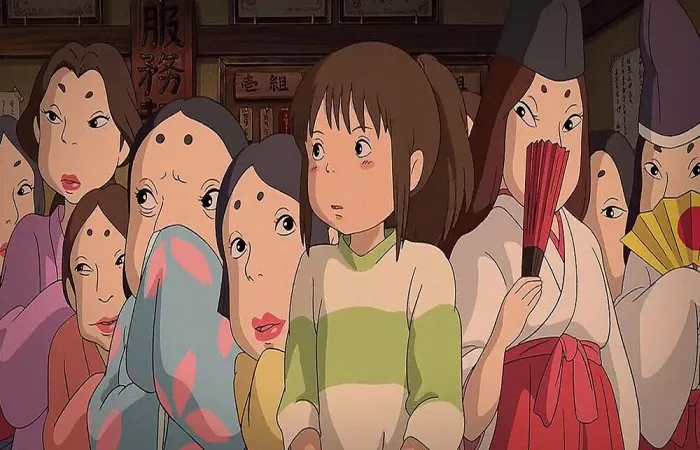Hayao Miyazaki’s Spirited Away (2001) is not just an animated film; it is a profound exploration of identity, growth, and the supernatural. As one of Studio Ghibli’s most celebrated works, it captivates audiences with its rich symbolism, intricate world-building, and emotional depth. But what exactly is the deeper meaning behind Spirited Away? This article delves into the film’s themes, characters, and cultural influences to uncover its true essence.
The Journey of Self-Discovery
At its core, Spirited Away is a coming-of-age story. The protagonist, Chihiro, begins as a whiny, fearful child but transforms into a resilient and compassionate individual. Her journey mirrors the universal struggle of growing up, where one must confront fears, adapt to new environments, and reclaim one’s sense of self.
Loss and Reclamation of Identity
Chihiro’s name is stolen by Yubaba, the bathhouse’s witch, symbolizing the loss of identity that often accompanies adulthood. As “Sen,” she must navigate a world where forgetting one’s true self leads to eternal servitude. This reflects societal pressures that force individuals to conform, losing their individuality in the process. Only by remembering her name does Chihiro regain her freedom, emphasizing the importance of self-awareness.
The Role of Work and Responsibility
The bathhouse represents the adult world, where labor is both a burden and a means of growth. Chihiro’s willingness to work, despite her initial reluctance, shows how responsibility shapes maturity. Her perseverance contrasts with the greed of other characters, such as No-Face, who consumes endlessly without purpose.
The Supernatural as a Mirror of Reality
Miyazaki masterfully blends Japanese folklore with a surreal, dreamlike setting. The spirit world is not just a fantastical escape but a distorted reflection of human society.
Spirits and Cultural Symbolism
Many spirits in the film derive from Shinto beliefs, where kami (spirits) inhabit natural elements. The Radish Spirit, River Spirit, and No-Face embody different aspects of human and environmental interactions. The polluted River Spirit, for instance, critiques environmental degradation, as Chihiro’s cleansing of it restores its true form.
Yubaba and Zeniba: Dual Faces of Authority
Yubaba, the greedy bathhouse owner, represents capitalist exploitation, while her twin sister Zeniba embodies wisdom and kindness. Their duality suggests that power can corrupt, but it can also nurture. Chihiro’s ability to navigate both worlds highlights the balance between resilience and compassion.
Themes of Greed and Redemption
Greed is a recurring motif in Spirited Away, driving both conflict and character development.
No-Face: The Hollow Pursuit of Desire
No-Face, a lonely spirit, seeks validation by mimicking others and offering gold, which only leads to destruction. His insatiable hunger mirrors modern consumerism, where materialism fails to fulfill emotional voids. Chihiro’s rejection of his gold and her kindness ultimately redeem him, showing that genuine connection triumphs over greed.
Haku’s Curse and the Price of Power
Haku, the river spirit turned dragon, loses his identity after seeking power under Yubaba. His arc parallels Chihiro’s, as both must break free from external control. His liberation comes only when Chihiro remembers his true name, reinforcing that true freedom lies in self-knowledge.
Love and Sacrifice
Beyond its fantastical elements, Spirited Away is a story about love in its purest forms.
Chihiro and Haku: A Bond Beyond Romance
Their relationship transcends typical romance, symbolizing mutual healing. Haku protects Chihiro, while she saves him from Yubaba’s curse. Their connection is rooted in childhood memories, suggesting that love is often about remembering and honoring one’s past.
Chihiro’s Parents: A Warning Against Gluttony
Her parents’ transformation into pigs serves as a cautionary tale about mindless consumption. Their fate underscores the film’s critique of greed, while Chihiro’s determination to save them highlights familial love.
The Ending: A Return with Renewed Wisdom
Chihiro’s return to the human world marks the completion of her journey. Though she leaves the spirit realm, the experience has irrevocably changed her.
The Symbolism of the Tunnel
The tunnel, which initially represented fear of the unknown, becomes a passage of growth. Chihiro emerges wiser, carrying the lessons of courage, empathy, and self-worth.
The Untied Hair Ribbon
A subtle yet powerful detail is Chihiro’s hair ribbon, a gift from Zeniba. Though seemingly mundane, it signifies that her spiritual journey remains a part of her, even in the real world.
The Journey of Self-Discovery
At its core, Spirited Away is a coming-of-age story. The protagonist, Chihiro, begins as a sullen, fearful child who is reluctant to embrace change. However, when her parents are transformed into pigs and she is trapped in the spirit world, she must adapt to survive.
Losing and Reclaiming Identity
Chihiro’s name is stolen by Yubaba, the bathhouse’s witch, symbolizing the loss of self in a world that seeks to exploit her. As “Sen,” she must navigate a realm where forgetting one’s true identity leads to eternal servitude. This mirrors the struggles of adolescence, where societal pressures often force individuals to conform, risking the loss of their authentic selves.
The Power of Resilience
Chihiro’s growth is marked by her increasing courage and determination. She learns to work hard, stand up for others, and confront her fears—whether it’s facing No-Face’s monstrous form or challenging Yubaba’s authority. Her journey reflects the universal transition from childhood dependence to self-reliant maturity.
Conclusion
Spirited Away is more than a fairy tale—it is a meditation on human nature, growth, and the unseen forces that shape our lives. Through Chihiro’s eyes, Miyazaki invites viewers to reflect on their own journeys, reminding us that courage, kindness, and self-discovery are the true keys to freedom.The film’s timeless appeal lies in its ability to balance fantasy with profound truths, making it a masterpiece that continues to inspire and enchant. Whether you see it as an allegory for childhood, a critique of society, or a spiritual odyssey, Spirited Away remains a cinematic treasure that reveals new layers with every viewing.
Related Topics
- Is Kimi No Na Wa Worth Watching?
- Will There Be a Sequel to Your Name?
- Why Is It Raining So Much In Weathering With You?


